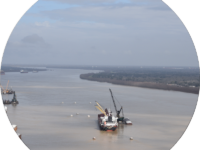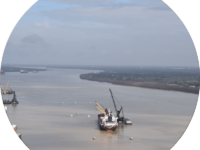Communications: A Whole New World

Ports shift communications methods and strategies during COVID-19, resetting how they engage.
By Tom Gresham
In the middle of the COVID-19 pandemic, the Port of Corpus Christi and the Port of Rotterdam negotiated and entered into a Memorandum of Understanding that will allow the two ports to collaboratively improve their global maritime operations. In more typical times, the agreement would have been hammered out through transatlantic flights and lengthy phone calls. Instead, the primary mode of communication was the virtual meeting.
Jeff Pollack, chief strategy officer for the Port of Corpus Christi, said that regularly scheduled virtual calls proved more fruitful in building a strong connection between the ports than traditional phone calls would have.
“I feel like we’ve really gotten to know each other quite well despite the distance, and, to that end, I think we’re in a much more intimate relationship now than we would have been without COVID,” Pollack said. “Without COVID, we wouldn’t have tried to use a platform like [Microsoft] Teams. We would’ve just had conference calls and there’s just a limitation with that. So, despite prohibiting us from traveling to be in person, I think COVID might’ve actually enhanced the depth of the relationship and accelerated the rate that we got to know each other.”
The arrival of the pandemic prompted widespread adoption of online tools throughout the port industry for both internal and external communication needs. Through creativity and ingenuity, port officials managed to maintain and even grow their efforts to engage with their full range of audiences – from tenants and staff to prospective partners and the local community. Many of their efforts worked so well that they are sure to survive beyond the pandemic, replacing old ways of doing things and informing new ones.
The pandemic-prompted shift online has been “a great success story,” said Melanie Stambaugh, communications manager for the Northwest Seaport Alliance.
“It’s great how people have adapted and transitioned into this online world and kept on doing their work and participating in public events,” Stambaugh said. “Despite everything, the world didn’t stop.”




